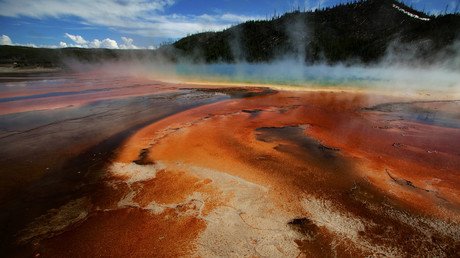Referendum on Trudeau: Liberals and Conservatives neck and neck as voters go to the polls in Canadian election
Canadians heading to the polls are faced with the choice of whether to grant a second term to scandal-plagued PM Justin Trudeau and his Liberal Party — or to hand the reins of power to Andrew Scheer and the Conservatives.
Trudeau, who raced to historic victory four years ago having branded himself as a young, fresh-faced progressive, likely did not expect to face such an uphill battle just four years later. Polls are extremely tight and analysts expect that whether the Liberals or Conservatives manage to pull ahead on Monday, the most likely outcome is that a minority government will be formed — a scenario in which the leading party must win support from other parties to be able to successfully pass legislation.
Also on rt.com Golden boy no more: As an election looms, two-faced Justin Trudeau has betrayed CanadaAn Ipsos poll published on October 15 showed the Liberals at 35 percent support and the Conservatives at 34 percent — but the most recent pre-election indications from the pollster showed the Conservatives with a slight lead of 33 percent to the Liberals’ 31 percent. No party, however, looks likely to win the 170 seats necessary to form a majority government in the House of Commons.
Referendum on Trudeau?
One thing is certain, however: Monday’s election is seen not necessarily as an assessment of the Liberals in general, but as a referendum on Trudeau personally. His premiership has been plagued by controversies — and while he might be hoping for the best, the embattled PM is surely bracing for the worst. Just days ago he warned voters that there "is a chance" the election could result in victory for the Conservatives.
In a sign of how tense and toxic the campaign has become, Scheer supporters broke into a chant of "lock him up, lock him up!" about Trudeau at a campaign event in Ontario at the weekend after the Conservative leader promised he would get to the bottom of the ongoing SNC Lavalin corruption scandal. The scene was reminiscent of Donald Trump’s anti-Hillary Clinton rallies during the 2016 US election.
Conservative supporters chant "Lock him up" about Trudeau tonight at Ontario event. @AndrewScheer corrects them and and they start chanting "Vote him out"pic.twitter.com/QrGe2BtKwB
— Barrett Wilson (@BarrettWilson6) October 20, 2019
Trudeau is alleged to have applied serious pressure to Canada’s ex-attorney general Jody Wilson-Raybould in an effort to force her to abandon a bribery investigation into SNC Lavalin — a Canadian firm accused of bribing officials to win lucrative business contracts in pre-NATO intervention Libya.
Liberal Canadians have also been angered by Trudeau’s seemingly phony progressivism as he talked plenty about climate change, but was seen to betray his promises by putting corporate oil interests ahead of environmentalism and buying the Trans Mountain pipeline for $4.5 billion — and vowing to expand it, despite a mass protests and objections from First Nations indigenous people. He also faced backlash for having broken federal ethics rules when he took a tropical vacation to an island owned by the Aga Khan in 2016.
Despite the scandals, Trudeau is still credited with many successes and campaign promises fulfilled, however — including the legalization of recreational cannabis and the introduction of a means-tested child benefit scheme. His government also reduced the age to receive Old Age Security from 67 back down to 65 — and introduced legislation on transgender rights. But Trudeau's fall from grace continued after he found himself at the centre of a blackface and ‘brownface’ scandal just weeks before the vote.
Also on rt.com Red-handed in blackface: THIRD example of Justin Trudeau in ‘racist’ makeup surfaces after PM swears he only did it ‘twice’Who else is in the running?
This election has mainly been a dogfight between the Liberals and Conservatives, but other smaller parties have attempted to capitalize on the dissatisfaction with Trudeau in the hopes that they could act as power brokers after the vote.
The left-leaning New Democratic Party (NDP) made gains during the final weeks of the campaign, thanks in part to strong debate performances by party leader Jagmeet Singh. The party has climbed from 14 percent support to around 20 percent support right before the election, according to some polls. The Green Party, meanwhile, who have positioned themselves as the only party serious about tackling climate change, have been hovering around 8 percent support.
Aware that many progressives are sorely disappointed in his leadership, Trudeau has encouraged Canadians to vote tactically, arguing that by giving their vote to the Greens or the NDP, they risk allowing the Conservatives to slip into power.
Lesser-supported fringe parties like the right-wing anti-immigration People's Party of Canada (PPC) and the Quebec nationalism party Bloc Québécois are also vying for seats. Conservatives worry that the PPC could swipe some of their votes from more right-leaning Canadians, but the party is still polling below 3 percent. As for the Bloc Québécois, recent polls have shown them surging in French-speaking region in the run up to voting day.
While much of the media coverage and talk has focused on Trudeau and his record, it hasn’t been plain-sailing for Scheer either. He has faced his own scandals, including being accused of concealing the fact that he holds a US passport. Sources also recently told The Globe and Mail that Scheer’s Conservatives hired the Daisy Group consulting firm to launch a coordinated campaign to smear PPC leader Maxime Bernier and his supporters as racist.
What are the biggest issues?
Aside from issues of personality, economic and environmental concerns have been on voters’ minds. The economy is picking up and unemployment is at near record low, but many Canadians still feel they aren't reaping the benefits or seeing the results in their own pockets. While some say they care about climate issues, many are also angered by the federal carbon tax imposed on provinces that failed to bring in their own climate change plans.
Healthcare has also been a major issue, despite a general consensus that Canada is an example of a country with a successful healthcare system. While the government covers necessary healthcare costs for Canadians, there are still concerns over wait times for non-emergency treatments and procedures, as well as complaints about the lack of doctors in more rural areas. The Conservatives have promised to cut wait times by buying more MRI and CT scan machines, while the Liberals say they will cut prescription costs.
Also on rt.com 'No longer US prisoner': Canada green-lights pipeline expansion despite environmental concernsThough, overall, many Canadians still feel the election campaign has been mostly about “nothing” and has been a “desert” from a public policy perspective, with no one issue dominating the headlines, no big ideas, and the vote turning into a referendum on Trudeau more than a serious discussion of policy differences.
Preliminary results are expected to be announced at around 8pm on Monday, but Canadians may be left in a cliffhanger situation if predictions are correct and neither party wins enough seats to form a majority government. In the event that the Conservatives win more seats than the Liberals, Trudeau, as the leader of the party in power, would technically still be allowed the first shot at forming a government with support from other parties.
Yet, whatever happens, it certainly looks unlikely that Trudeau will pull off a repeat of the 2015 election when his party won 184 seats in a stunning upset, stealing power from the Conservatives, who had held on to it for the previous decade.
Like this story? Share it with a friend!














